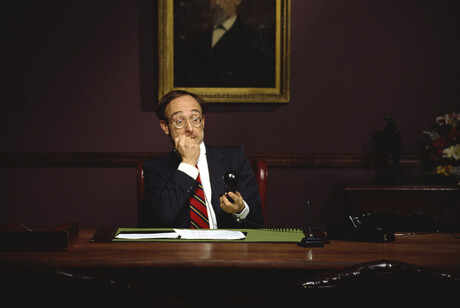Have you ever played the “where were you” game?
Where were you when the towers fell? Where were you when Mount St. Helens blew? Where were you when the Challenger exploded? Where were you when JFK was shot?
Each question references a point in time when we all knew life would never be the same again. They are emotional forks in the road that divide everything into before and after.
As a spiritual leader, you know the difference one moment can make — maybe not on the scope of a national disaster, but a turning point just the same. You’ve been there when the lights came on and you could see your team get it. You’ve felt the tide turn in a meeting. You’ve sat in silence with someone as they realized the one they loved was truly gone.
One moment can change everything, but I wonder how many moments we miss — moments that could've redefined everything, moments that slipped by, moments unnoticed like the one that must've passed over most of the people who heard Jesus proclaim the beginning of His ministry in Mark.
Without much preamble, Mark shows Jesus getting right down to the business of preaching the good news with these words: “The time has come ... the Kingdom of God is near. Repent and believe the good news” (Mark 1:15).
Perhaps we too might miss the significance of what Jesus was saying without a second look. This could be nothing more than a straightforward announcement opening Christ’s ministry to the world. However, there is so much more in this simple statement than meets the eye. If we’re willing to take a closer look, it can transform not just our own spiritual development, but also how we, as spiritual leaders, can co-operate with the work of the spirit in the lives of those we lead.
From the very first word, this simple statement becomes the doorway to a new reality. You don’t have to be a great Greek student to know Mark had a couple of options to choose from when he wrote, “The time has come.”
We’re quite familiar with the more common option that we actually use frequently in English. He could have used the word “chronos” which refers to the minute-by-minute ticking of the clock that marks the sequence of our days. It's one of the ways we measure how the events in our lives relate to one another. We use it to say, “This came before, or after, that,” for example.
Mark used a different word in Greek for time — one that may be less familiar to our way of thinking, but certainly something his first readers would have understood very well. He used the term “kairos” when Jesus begins speaking about time. Kairos is exactly the word you would use when you might ask your friend, “Do you remember the time the twin towers fell?” or when the preacher says to the groom, “It's time,” just before they walk out to meet his bride on their wedding day.
Unlike chronological time, which measures the flow of our moments, kairos time is intended to measure the significance of any one of them. It’s a verbal stop sign inviting us to pause for a moment and consider just what is about to change. Obviously, some of our kairos moments are impossible to miss. If you and I had been standing there with Jesus, would we have recognized the seismic shift in reality He was announcing. Sometimes a kairos moment will fly on by without us ever noticing.
Consider His next words for a moment: “The Kingdom of God is near.” It was so near in fact that it was standing right in front of everyone. Jesus was trying to tell everyone that a completely new way to live was now available to them.
This idea of “the Kingdom of God” is the antithesis of the reality they were used to. There’s an alternative to “the kingdom of this world” and the doorway to that new life was standing right in front of them. Visibly, nothing had changed. The same slightly dusty preacher with hard calloused hands was standing on the same Palestinian hillside, but if you had ears to hear, you could have heard a thunderclap roll across the cosmos. If you had eyes to see, you could have watched the demons quake as they realized the King was opening the gates of heaven and inviting all who would to enter in.
In order to take all that in, it required the listener to pause for a moment in the hustle and flow of their chronological day and ask a simple but profound question, “What does this mean for me?” Without that pause, the moment is lost and, with it, the learning that comes from spending a moment living in it.
So how do we catch those kairos moments before they fly by unnoticed? How do we, as spiritual leaders, encourage others to capture the experience Jesus would refer to later as the Holy Spirit, “guiding you into all truth?”
Jesus actually gave us a simple formula that helps us pause and enter into what Walt Breen and Mike Kalistadt refer to in their book, The Passionate Life, as “the learning circle.” In Mark 1:15, Jesus says, “The time has come ... the Kingdom of God is near. Repent and believe the good news.” Repent and believe; those two words are the key.
Like so many other words in our Christian vocabulary, those two words have picked up quite a bit of spiritual baggage along their 2,000-year journey. However, in the first century they were perfectly practical everyday kinds of words, and they give us a prescription for an attitude that can turn any singular moment in time into a learning experience if we’re willing to embrace it.
Let’s start with the idea of repentance. For many of us, the word conjures up images of wild-eyed street preachers and leaves us with a pervasive sense of undefined guilt. If we strip back the spiritual baggage, to repent is another way of saying, “I changed my mind.” For example, “I was going to have mint chocolate chip, but now I think I’ll have rocky road.” It’s all about taking a moment to reconsider.
Broken down to its component parts, repentance is a three-step process of observing our situation, reflecting on it and discussing it to unpack what just happened. Sometimes that kind of processing can happen so fast you don’t have time to break it down, like the moment I accidentally touched an electric fence. I repented instantly! I observed that my situation was incredibly painful, reflected on my poor judgment and began the discussion of my situation at high volume, all before I really thought through what was happening.
Of course, most of the time, we have the luxury of engaging in that process at a more leisurely pace if we’re willing to take a moment to do so. That was exactly what Jesus asked his hearers to do. The Kingdom of God is near, but you’ll have to pause for a moment and consider the situation or it will fly by.
But kairos moments have little impact unless I’m willing to both repent and believe. Just like the word, “repent,” the word “believe” has picked up its own religious context. At its core, belief is an invitation to take action, not just to accept information.
Just as repentance is the call to change course, belief is the challenge to take the first steps in that new direction. It’s a call to plan out a new course, account for the journey with others and then act upon it.
As I write this, I am nearing the beginning of a new experience for me. I’m taking a sabbatical. Thanks to the graciousness of my employers, I entered into a kairos moment. I repented. I observed that I needed a change of pace and reflected on my options. I took the time to talk it through with my wife and my supervisor, and then I believed. I began to plan what I was going to do and decided it was time to get that book I’ve been thinking about out of my head and onto paper.
What does this have to do with believing? Since belief is really all about action and not just head thoughts, I took that plan to write a book and began to tell other people — like all of you reading this — that I would be writing a book. I did that precisely because I’ll be much more likely to stay on track and get the job done if I know there are others who’ve heard about my plan and want to see the finished product.
This is the power of a kairos moment. It’s an invitation to let life’s experiences, good or bad, become more than just another forgotten blip in the story of our lives. It’s a chance to let the Holy Spirit do exactly what He was promised for in the first place.
I’ll tell you that when you recognize the signs, you’ll see opportunities for kairos moments popping up all around you. One of my favorites is when I find myself, or hear one of my leaders, asking, “Why does this keep happening to me?” That’s a sure sign of a kairos moment coming back around for another swing.
The Kingdom of God is just as near as it has ever been — even nearer than ever, if that were possible — and the kairos moments will keep coming. When God promises to work all things for the good of those who love Him, I believe kairos moments are one of his most powerful tools in fulfilling that promise.
When we see the stress and strain show up in the lives of those we serve, what better response could we have than to pause for a moment, enter the learning circle with them and let the power of that moment begin to change us.








